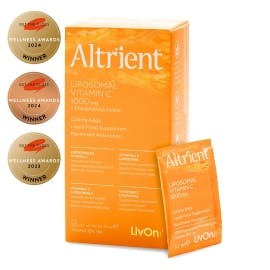Are you low in vitamin C?
Chances are if you are a smoker or you’re not eating enough vitamin C rich fruit and vegetables at each meal – then you may very well be low in vitamin C. The UK government recommends five portions of fruit and vegetables a day to keep healthy, but many people find this difficult to achieve.
According to Eurostat statistics, in 2014 only one in seven people across the entire European Union (EU) reported consuming at least five fruits and vegetables daily.(1) In addition to this, research has identified that smokers are three times more likely to be severely vitamin C deficient.(2) So what are the consequences of not getting enough vitamin C?
Fatigue
Vitamin C (ascorbic acid) is part of a complex chain of events within the body that generates energy. Specifically, it helps to synthesise carnitine, which plays an important role in energy production by helping to transform fat into energy. Carnitine transports long chain fatty acids into the mitochondria, (the powerhouses in our cells) so they can be burned to produce energy. An absence of vitamin C may impair the creation of carnitine. In addition to this vitamin C increases iron absorption and without adequate iron the body could easily become anaemic. Fatigue is one of the most common signs of iron deficiency.
Bleeding gums, gingivitis or loose teeth
Another of vitamin C’s key roles in the body is to contribute to normal collagen formation for the normal function of skin, bones, cartilage, teeth, gums and blood vessels. Without collagen, the walls of blood vessels could become extremely fragile and may damage easily. A lack of collagen could also lead to difficulty healing. Bleeding gums, gingivitis or loose teeth are signs of scurvy and could possibly indicate that there may be deterioration in collagen and a possible vitamin C deficiency.
Slow wound healing and bruising
If you notice your wounds are taking longer than usual to heal and bruising occurs easily, then this might suggest you are not getting enough vitamin C in your diet to help the body synthesise collagen and build tissues. Because vitamin C contributes to normal collagen formation for the normal function of skin and blood vessels it offers valuable nutritional support for healing wounds and forming scar tissue.
Tired, dry, wrinkled skin
Vitamin C is notable for its important role in supporting skin health because of its contribution to normal collagen formation for the normal function of skin. Therefore, it stands to reason that a deficiency in vitamin C may lead to poor skin health. Dryness and lack of moisture also contributes to premature ageing and the appearance of wrinkles.
Over exposure to the UV rays in sunlight tends to increase the production of free radical molecules that lead to oxidative damage in the delicate skin tissues, which may accelerate the skin ageing process. Vitamin C functions to protect the skin from the damaging effects of free radicals because of its role in contributing to the protection of cells from oxidative stress.
Joint aches and pains
Because of the body’s requirement for vitamin C to contribute to normal collagen formation for the normal function of cartilage, a dietary deficiency of vitamin C may affect the formulation of cartilage in normal joints. Cartilage is weakened in conditions such as arthritis and there may be additional cellular damage due to oxidative free radical activity. Vitamin C’s neutralising properties may help to counteract this damage by contributing to the protection of cells from oxidative stress as well as supporting the generation of new cartilage. Taking non-steroidal anti-inflammatory drugs prescribed for arthritis may lower the levels of vitamin C contributing to further problems.
Depression and mood swings
Studies have identified that people with depression have significantly lower levels of certain antioxidants including vitamin C than their healthier counterparts. Research into depression in the elderly has also found that low levels of vitamin C may be a factor. This may be due in part to vitamin C’s contribution to the normal functioning of the nervous system and its contribution to normal energy yielding metabolism. The brain is one of the most metabolically active organs in the body and as such has particularly intense energy demands.(3)
It is thought that the link between vitamin C and low mood may be due to imbalanced neurotransmitter levels. Ascorbic acid (vitamin C) participates as a cofactor in several enzyme reactions including those involved in the synthesis of neurotransmitters such as dopamine and norepinephrine – which are involved in regulating mood.
Encouraging older people to include more fruit and vegetables in their diet is wise, however for those that are unwilling or unable to cook a supplement may be advisable.
Always picking up coughs and colds?
According to research vitamin C contributes to the normal function of the immune system, so it is not unreasonable to assume that a vitamin C deficiency may be associated with a suppressed immune system. Evidence suggests that vitamin C concentrations in the blood plasma and white blood cells decline during infections and stress, and that vitamin C may be involved in the biological mechanisms that enhance the production of the white blood cells that we need to ingest or destroy bacteria and viruses. What’s more recent research has shown that if taken at the onset of a viral infection, vitamin C consumption could help reduce the duration and severity of a cold.
Fortunately, we have plenty of access to fresh fruit and vegetables in Europe, so if you suspect you may have a vitamin C deficiency this is easily remedied. However, if your diet restricts your fruit and vegetable intake, or you simply don’t find it easy to include them in your meals, supplementing with vitamin C is an effective and easy option.
Choosing the right vitamin C may present a dilemma, unfortunately standard oral vitamin C supplements are not well absorbed. What’s needed is a high-quality vitamin C with superior absorption such as liposomal Altrient C.
Liposomal forms of vitamin C offer superior absorption
Altrient C offers the perfect solution because of its scientifically proven liposomal delivery method. This powerful form of transportation encapsulates the nutrient in a microscopic phospholipid bubble that carries it directly to bloodstream and to the cells, protecting it from the oxidation and degradation normally encountered during digestion. Altrient C is the most effective option for supplementing with this multifunctional nutrient.
Jacqueline Newson BSc (Hons) Nutritional Therapy
References
- Clarke DD & Sokoloff L. Regulation of Cerebral Metabolic Rate. https://www.ncbi.nlm.nih.gov/books/NBK28194/ [Accessed 11.12.19]
- Eurostat. Fruit and vegetable consumption statistics. Statistics explained. 15.11.18. https://ec.europa.eu/eurostat/statistics-explained/pdfscache/68501.pdf [Accessed 11.12.19]
- Hamer M et al. Depression, Physical Function and risk of mortality: National Diet and Nutrition Survey in Adults older than 65 years. American Journal of Geriatric Psychiatry 2011.
- Léger D. Scurvy: reemergence of nutritional deficiencies. Can Fam Physician. 2008;54(10):1403–1406.
- NHS. Scurvy. https://www.nhs.uk/conditions/scurvy/[Accessed 11.12.19]
- Robert E. Hodges, James Hood, John E. Canham, Howerde E. Sauberlich, Eugene M. Baker, Clinical manifestations of ascorbic acid deficiency in man, The American Journal of Clinical Nutrition, 1971; 24, 4: 432–443.
- Schectman G, Byrd JC, Gruchow HW. The influence of smoking on vitamin C status in adults. Am J Public Health. 1989;79(2):158–162. doi:10.2105/ajph.79.2.158
- Telang PS. Vitamin C in dermatology. Indian Dermatol Online J. 2013;4(2):143–146. doi:10.4103/2229-5178.110593


.jpg?auto=format&q=45&w=262&trim=auto)
.jpg?auto=format&q=45&w=262&trim=auto)
